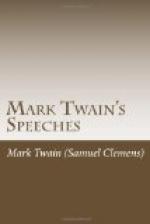I think I ought to be allowed to talk as long as I want to, for the reason that I have cancelled all my winter’s engagements of every kind, for good and sufficient reasons, and am making no new engagements for this winter, and, therefore, this is the only chance I shall have to disembowel my skull for a year—close the mouth in that portrait for a year. I want to offer thanks and homage to the chairman for this innovation which he has introduced here, which is an improvement, as I consider it, on the old-fashioned style of conducting occasions like this. That was bad that was a bad, bad, bad arrangement. Under that old custom the chairman got up and made a speech, he introduced the prisoner at the bar, and covered him all over with compliments, nothing but compliments, not a thing but compliments, never a slur, and sat down and left that man to get up and talk without a text. You cannot talk on compliments; that is not a text. No modest person, and I was born one, can talk on compliments. A man gets up and is filled to the eyes with happy emotions, but his tongue is tied; he has nothing to say; he is in the condition of Doctor Rice’s friend who came home drunk and explained it to his wife, and his wife said to him, “John, when you have drunk all the whiskey you want, you ought to ask for sarsaparilla.” He said, “Yes, but when I have drunk all the whiskey I want I can’t say sarsaparilla.” And so I think it is much better to leave a man unmolested until the testimony and pleadings are all in. Otherwise he is dumb—he is at the sarsaparilla stage.
Before I get to the higgledy-piggledy point, as Mr. Howells suggested I do, I want to thank you, gentlemen, for this very high honor you are doing me, and I am quite competent to estimate it at its value. I see around me captains of all the illustrious industries, most distinguished men; there are more than fifty here, and I believe I know thirty-nine of them well. I could probably borrow money from—from the others, anyway. It is a proud thing to me, indeed, to see such a distinguished company gather here on such an occasion as this, when there is no foreign prince to be feted—when you have come here not to do honor to hereditary privilege and ancient lineage, but to do reverence to mere moral excellence and elemental veracity-and, dear me, how old it seems to make me! I look around me and I see three or four persons I have known so many, many years. I have known Mr. Secretary Hay—John Hay, as the nation and the rest of his friends love to call him—I have known John Hay and Tom Reed and the Reverend Twichell close upon thirty-six years. Close upon thirty-six years I have known those venerable men. I have known Mr. Howells nearly thirty-four years, and I knew Chauncey Depew before he could walk straight, and before he learned to tell the truth. Twenty-seven years ago, I heard him make the most noble and eloquent and beautiful speech that has ever fallen from even his capable lips.




